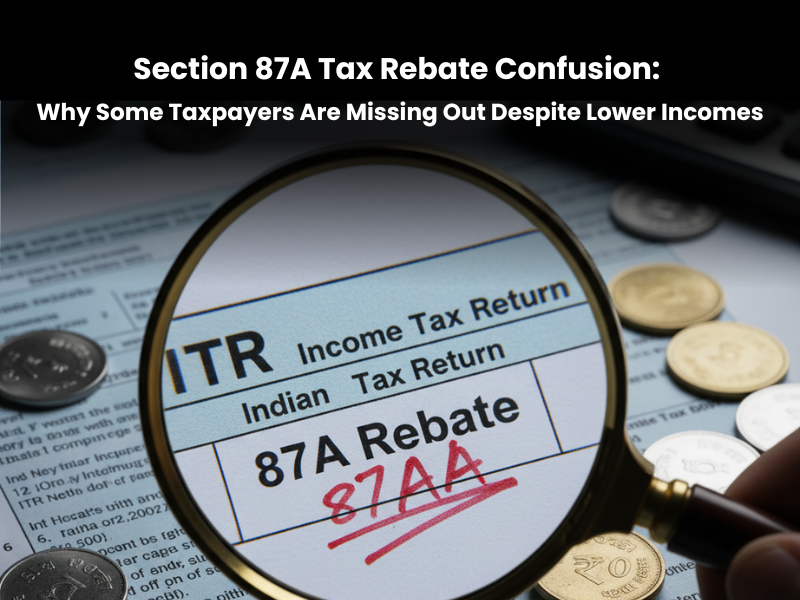Tax rebates under Section 87A have always been a relief for small taxpayers. They ensure that resident individuals with modest incomes don’t have to pay income tax if their income falls within the prescribed threshold. But in recent months, confusion has emerged among taxpayers regarding the denial of this rebate in certain cases – especially under the new tax regime.
What is Section 87A Rebate?
Section 87A allows resident individuals to claim a rebate on their tax liability, provided their taxable income is up to a specified limit:
- Old Tax Regime: Income up to ₹5 lakh → rebate up to ₹12,500.
- New Tax Regime (from AY 2026-27 onwards): Income up to ₹12 lakh → rebate up to ₹60,000 (nil tax payable if eligible).
👉 In simple terms, if your income falls within these limits, you don’t have to pay income tax.
The Problem: Denial of 87A on Special Rate Incomes (FY 2024-25, AY 2025-26)
On paper, the rule looks simply. But while filing returns for AY 2025-26, many taxpayers noticed that the system was not granting the rebate if their income included special rate components, such as:
- Short-term capital gains (STCG) on equities/mutual funds (taxed 15% under Section 111A).
- Long-term capital gains (LTCG) on equity shares (taxed under Section 112A).
- Lottery winnings, online gaming, or other income taxed at special rates.
This is problematic because the Finance Act 2025 stated that such restrictions would apply only from FY 2025-26 (AY 2026-27). Yet, the ITR utility is prematurely applying these rules for FY 2024-25, leaving taxpayers with an unexpected tax demand.
Real-Life Scenarios
To understand the confusion better, let’s take two examples:
- Case 1: Mr. Anand earns ₹6.8 lakh under the new regime (salary income only).
- Tax payable: Nil (since 87A rebate applies). ✅
- Case 2: Mr. Rajesh earns ₹6.5 lakh (₹5.5 lakh salary + ₹1 lakh STCG from equity).
- Tax payable: Instead of Nil, the system is calculating tax on the ₹1 lakh STCG, denying the rebate. ❌
Both individuals have income below ₹7 lakh, yet one gets full rebate while the other doesn’t – only because of the source of income.
What Happens from FY 2025-26 Onwards?
From FY 2025-26 (AY 2026-27), the law becomes very clear. The rebate under Section 87A will not apply to:
- Long-term capital gains (LTCG),
- Short-term capital gains (STCG) on equity,
- Lottery winnings,
- Online gaming winnings, etc.
This means that even if your income is below ₹12 lakh under the new regime, the portion of tax attributable to these special incomes cannot be reduced by claiming the rebate.
What Should Taxpayers Do?
For FY 2024-25 (AY 2025-26), taxpayers should:
- Manually recheck tax computations instead of relying only on the ITR portal.
- Segregate normal income and special rate income before applying the rebate.
- Consider opting for the old regime if your income includes capital gains and your taxable income is within ₹5 lakh.
Final Thoughts
Section 87A was designed to protect small taxpayers from additional tax burden. However, premature restrictions in the ITR filing system have created avoidable confusion.
- For FY 2024-25, denying the rebate goes against the law as it stood at that time.
- From FY 2025-26 onwards, the law is clear – special incomes will not get 87A rebate under the new regime.
👉 If your income includes capital gains, lottery, or gaming winnings, carefully review your ITR before submission. Paying extra tax today due to oversight could cost you more than necessary.

